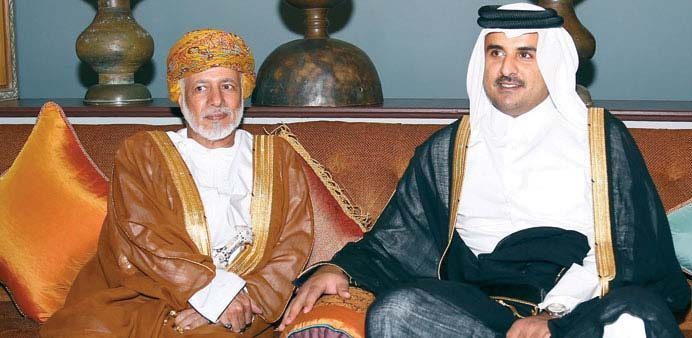
Qatar diplomacy was in full force this week as the new Emir visited several Gulf countries to forge deeper ties with leaders sometimes more than twice his age. Michael Stephens, a researcher for the Royal United Services Institute for Defence and Security Studies in Qatar, explains why the country needed Sheikh Tamim to take this step.
On Thursday, Qatar’s new Emir concluded a whistle-stop, three-day tour of the Gulf nations in an apparent attempt to strengthen regional relations, and underline Qatar’s support for closer GCC integration.
The handing of power from Sheikh Hamad bin Khalifa al Thani to his 33-year-old son Sheikh Tamim in June has signaled a new and more open phase of GCC politics.
The rulers of Bahrain, the United Arab Emirates and Saudi Arabia have all indicated that they are ready to welcome Qatar’s Emir – the region’s youngest leader – and have looked favorably upon his efforts to re-orient Qatar’s foreign policy strategy.
Pleased to have met my brother Shk. Tamim bin Hamad Al Thani, Emir of Qatar. pic.twitter.com/fCuyZCmagF
— HH Sheikh Mohammed (@HHShkMohd) October 30, 2013
The development follows a turbulent 18 months in the Gulf, in which Qatar’s relationship with the Muslim Brotherhood – not only in Egypt but across the Arab world – strained its ties with neighboring Saudi Arabia and the UAE, who worried that MB sympathizers would threaten their own internal stability.
We often hear talk of brotherly relationships between the GCC nations, but relations between Qatar and its neighbors were anything but brotherly over the past year and a half.
Continued attacks from writers in Bahrain and the UAE, combined with aggressive twitter campaigns against Qatar made it clear that relations had soured deeply since Qatar began its adventurous role in regional affairs.
The arrival of the new Emir is therefore a welcome opportunity for all in the GCC to take stock of the previous two years, learn from the experience and move forward in a more cooperative fashion.
Qatar now plays a far quieter, yet still important role in the Middle East, and while Sheikh Tamim has signaled his desire for greater cooperation, Qatar will never go back to being the isolated peninsula that it once was.
The GCC nations for their part understand this, and the challenge is to incorporate Qatar back into the fold whilst simultaneously realizing that it will still be an assertive and individualistic player in regional politics.
Iran question
Additionally, it is important to remember that policy is not just made in a vacuum in which actions have no reactions.
Qatar is the consummate balancer, and rebuilding ties to the GCC countries has to be balanced within the framework of Qatar’s relationship to Iran. Qatar shares critical national interests primarily in energy security with the Islamic republic, and must always consider how best to maintain functional relations with it.
As if to underline this fact, Sheikh Tamim phoned President Hassan Rouhani a few weeks before his GCC tour, on Oct. 15, to express his desire to enhance bilateral relations, and also to invite him to visit Doha in the near future. Qatar clearly has no intention of alienating Iran while it pursues efforts to mend relationships with its Arab neighbors.
In fact, Doha looks to be adopting the Turkish policy of “no problems with neighbors.” But as Turkey has found, this isn’t an easy policy to maintain. Bahrain, Syria and Iraq have all pitted Iran against Qatar’s neighbor Saudi Arabia in a regional cold war.
Qatar, like all small Gulf nations, has to balance its need to retain relations with both sides, despite increasing tension and uncertainty regarding Iran’s nuclear enrichment program and its continued support for embattled Syrian President Bashar al Assad.
With the perception that the United States is weakening, leaving spaces for regional actors like Saudi Arabia to assert their influence, these are potentially perilous times, and Sheikh Tamim working to engage closely with all sides is Qatar’s best strategy.
Should Qatar be forced into a position where it must choose between its Arab brothers and Iran, it will of course side with the GCC.
But it is ever the goal of a country so used to balancing competing interests to prevent this scenario from occurring, and a very active month of Qatari diplomacy will go far to ensuring that Qatar does not have to make this choice any time in the near future.
Thoughts?







